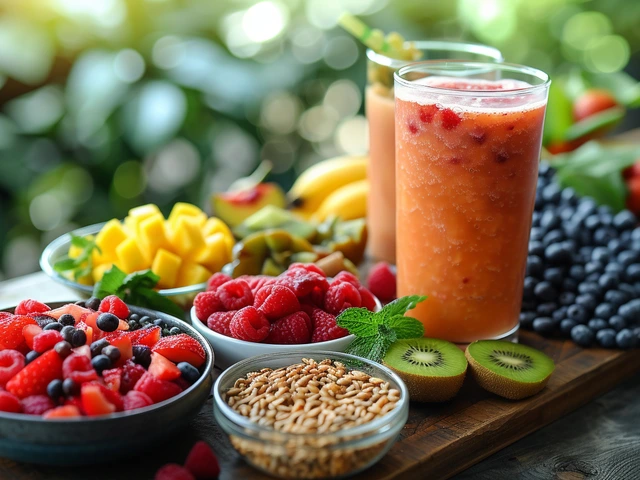Snack Tips: Smart, Simple Bites for Better Health
Craving a snack? A single swap—like switching chips for a handful of nuts—can cut your afternoon slump, help your heart, and steady your mood. Snacks should do one job: give useful fuel without wrecking your next meal. Aim for a balance of protein, healthy fat, and fiber. That combo keeps you full, steadies blood sugar, and supports brain health.
Quick Snacks for Energy and Mood
Keep these go-to combos ready so you don’t grab empty calories when you’re hungry: apple slices + 1 tbsp almond or peanut butter; Greek yogurt + frozen berries + 1 tsp chia or ground flax (great source of omega-3); carrot sticks + hummus; 1 oz mixed nuts (about a small handful) with a clementine; cottage cheese + sliced cucumber or pineapple. For a pre- or post-workout boost, try a banana with 1 tbsp peanut butter or a small protein shake with spinach and frozen mango.
Want a heart-friendly snack? Pick oats, walnuts, berries, and seeds. Walnuts and flax contain ALA omega-3s that support heart and brain health. Swap sugary granola bars for homemade energy bites made with oats, nut butter, and a little honey—portion to one or two bites to avoid excess calories.
Pressed for time? Batch-prep: cut veggies into snack sticks, portion nuts into small bags, and freeze banana slices for quick smoothies. Keep a jar of plain Greek yogurt in the fridge and add toppings as needed—berries and seeds turn it into a nutrient-dense treat in seconds.
Dog-Friendly Snack Ideas and Safety
Human snacks aren’t always safe for dogs. Never share chocolate, grapes, raisins, onions, garlic, or anything with xylitol. Instead, try plain cooked chicken pieces, thin apple slices (no seeds), blueberries, small carrot sticks, or a spoonful of plain canned pumpkin (not pie filling). Unsweetened peanut butter is great for enrichment—spread a bit in a toy and freeze it for a long-lasting treat.
Portion control matters for dogs too: small breeds need tiny treats—think pea-sized—while larger dogs can handle slightly more. Use healthy snacks as training rewards or to stuff puzzle toys; that gives both mental and physical benefit. If your dog has weight, kidney, or other health issues, check with your vet before introducing new snacks.
Final practical moves: keep a small snack drawer or box with pre-portioned options, plan one or two simple recipes you like, and swap one processed snack a day for a whole-food option. Small consistent changes—better fats, a bit more protein, and fiber-rich foods—add up fast for your heart, brain, and energy levels. Try one swap this week and see how you feel.

Nourishing Kids: Tasty and Healthy Snack Ideas
Encouraging children to eat healthily can be a rewarding journey, filled with taste tests and colorful food adventures. This article explores a variety of nutritious snack ideas that cater to the tastes and energy needs of young ones. It guides parents in making informed choices that blend health with fun, ensuring kids are excited about their snack time. Discover practical tips and intriguing facts to instill lifelong good eating habits in your children.




